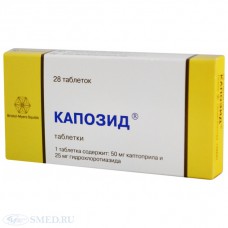Expiration date: 02/2026
The composition and form of issue:
Tablets, 1 tablet contains:
captopril 25 or 50 mg
hydrochlorothiazide 25 mg
excipients: cellulose, corn starch, stearic acid, milk sugar, magnesium stearate
in packing contour cell 14 PCs. in cardboard pack 2 packs.
Description of pharmacological action:
Capozid — combination drug, hypotensive and diuretic action. Captopril — ACE inhibitor, reduces the formation of angiotensin II from angiotensin I, reduces the release of aldosterone, decreases SVR, BP, post - and preload. Dilates arteries to a greater extent than veins. Increases coronary and renal blood flow. With long - term use decreases myocardial hypertrophy and arterial walls resistive type improves blood flow to ischemic myocardium reduces platelet aggregation.
Hydrochlorothiazide is a thiazide diuretic of medium strength, reduces the reabsorption of sodium ions at the level of the cortical segment of the Henle loop. Does not affect the acid-base state (braid). Lowers blood PRESSURE by changing the reactivity of the vascular wall, reducing the Pressor effect of vasoconstrictors (epinephrine, norepinephrine) and increasing the depressive effect on vegetative ganglia (to a lesser extent, by reducing BCC). Enhances the hypotensive effect of captopril.
Indications:
Arterial hypertension.
Contraindications:
Hypersensitivity to captopril, diuretic drugs thiazide-type sulphonamides (possible cross-allergic reactions), angioedema (in anamnesis in patients receiving ACE inhibitors), aortic stenosis, mitral stenosis, hypertrophic obstructive cardiomyopathy with obstruction of the output tract of the left ventricle, bilateral renal artery stenosis, renal artery stenosis to a solitary kidney, kidney transplantation (history), heart failure, cardiogenic shock, hypotension, tachycardia, severe liver failure (precoma or coma) severe renal failure (serum creatinine greater than 1, 8 mg/100 ml or creatinine clearance less than 20-30 ml/min, anuria), primary hyperaldosteronism, pregnancy, lactation.
With caution (with careful monitoring): moderate renal failure (serum creatinine 1 to 8 mg/100 ml or creatinine clearance 30-60 ml/min), with an increase in the allocation of protein in the urine (more than 1 g/day), hypokalemia (medication not corregidas) hyponatremia, hypovolemia, hypercalcemia, gout, connective tissue and other immune diseases (including systemic lupus erythematosus, scleroderma, nodular periarteritis), old age (over 65 years), simultaneous administration of drugs that suppress the protective reactions of the body (glucocorticosteroids, cytostatics, immunosuppressants), as well as allopurinol, procainamide and lithium drugs.
Side effect:
Tides of blood to the skin of the face, fever, dizziness, headache, tachycardia, palpitations, swelling of the shins, excessive reduction of blood pressure (including orthostatic) with symptoms of dizziness, feeling of weakness, visual impairment in rare cases-fainting, increased heart rate (tachycardia), heartbeat (palpitation), with a sharp or prolonged excessive decrease in blood PRESSURE-transient violation of cerebral circulation, stroke, heart myocardium.
Violations of water-electrolyte balance: dry mouth, thirst, fatigue, depression, drowsiness, weakness in rare cases — reducing the formation of lacrimal fluid.
Bronchospasm, dry cough, in rare cases — respiratory failure, sinusitis, rhinitis, laryngitis.
Angioedema of the larynx, pharynx and / or tongue angioedema, allergic reactions (up to the development of pulmonary edema), skin rash (exanthema, in rare cases hives). Multiple erythema (erythema multiforme), exfoliative dermatitis, Stevens-Johnson syndrome, and toxic epidermal necrolysis. These changes in the skin may be accompanied by a rise in body temperature, pain in muscles and joints, the development of vasculitis.
In some cases, changes in the skin resembling psoriasis, photosensitivity, hair loss, disorders of the nails (onycholysis).
Nausea, vomiting, constipation or diarrhea, discomfort in the stomach, abdominal pain, loss of appetite, acute cholecystitis (with cholelithiasis), hemorrhagic pancreatitis, hepatitis, cholestatic jaundice.
With prolonged use: gingival hyperplasia, asthenia, disturbances of taste, deterioration of renal function, nephritis.
Headache, fatigue, in rare cases-depression, depression, sleep disorders, impotence, convulsions, imbalance, dizziness, tinnitus, visual impairment, progression of myopia, tremor, paresthesia, taste disorders.
Anemia, reduction of hematocrit, thrombocytopenia, leukopenia, neutropenia (up to the development of pancytopenia and agranulocytosis-especially against the background of simultaneous administration of allopurinol, procainamide, as well as drugs that reduce immunity), eosinophilia, increased titer of anti-nuclear antibodies, proteinuria, increased activity of hepatic transaminases, hyperlipidemia, hyperbilirubinemia gout). In rare cases, especially in patients with renal insufficiency, there may be an increase in serum concentrations of urea, creatinine and potassium (the risk of hyperkalemia is also increased in patients with diabetes), as well as hyponatremia.
Drug interaction:
Capozid increases the concentration of digoxin in plasma by 15-20%, increases the bioavailability of propranolol.
Cimetidine, slowing the metabolism of captopril in the liver, increases its concentration in plasma.
The combination with nitrates, thiazide diuretics, verapamil, beta - blockers and other antihypertensive drugs, as well as tricyclic antidepressants, sleeping pills and ethanol increases the severity of the hypotensive effect.
The risk of immunosuppressive action increases with the combined use of procainamide, flecainide, drugs, blocking tubular secretion (reducing the number of leukocytes and granulocytes).
While the appointment of Capozid the drug lithium may slow excretion of lithium from the body (strengthening of the damaging effect on the heart and CNS).
LS, intensively binding to proteins, enhance the diuretic effect of hydrochlorothiazide.
Caposide increases the neurotoxicity of salicylates, the effect of curarepodobnyh muscle relaxants, ethanol.
Reduces the excretion of quinidine, the effect of oral hypoglycemic drugs, norepinephrine, epinephrine and anti-podagric agents.
Caposide increases the side effects of cardiac glycosides, especially with concomitant administration with drugs that increase the release of K+ and Mg2+ and / or delay Ca2+ (e.g. diuretics, adrenal cortex hormones, laxatives, amphotericin B, carbenoxolone, penicillin G, salicylates).
While taking methyldopa may develop hemolysis of red blood cells. Cholestyramine reduces the absorption of Capozid. Salt, NSAIDs reduce the severity of the hypotensive action of Capozid.
Potassium salts, potassium-sparing diuretics and heparin contribute to the development of hyperkalemia.
The purpose of the Capozid in the background of dialysis with certain dialysis membranes of high permeability (for example, a polyacrylonitrile - methallylcyclopentane membranes) increases the risk of hypersensitivity reactions (anaphylactoid reactions).
Method of application and doses:
Inside, regardless of the time of meal. In the absence of side effects, treatment can be carried out for an unlimited time. The dose is selected individually, according to the severity of the disease. Treatment should begin with an intake of 1 table. The Capozid, containing 25 mg of captopril and 25 mg hydrochlorothiazide per day, or 1/2 table. The Capozid that contains 50 mg captopril and 25 mg hydrochlorothiazide. In the future, if necessary, the dose can be increased to 2 tables. per day (100 mg captopril and 50 mg hydrochlorothiazide), or reduced to the minimum effective.
Special instruction:
At the beginning of treatment, there may be an excessive decrease in blood PRESSURE, especially in patients with heart failure, severe hypertension (including renal origin) and/or renal failure.
Before treatment, the Capozid must compensate for the deficit of Na+ and BCC (to reduce the dose of prescribed diuretics or, in some cases, cancel them completely).
Before starting treatment, check renal function.
It is necessary to regularly monitor the content of potassium and calcium in plasma (especially in patients receiving treatment with digitalis preparations, hormones of the adrenal cortex, often using laxatives, as well as in elderly patients), glucose, uric acid, lipids (cholesterol and triglycerides), urea and creatinine, liver transaminase activity.
Particularly careful monitoring of blood PRESSURE and laboratory parameters is necessary in the following cases: in patients with renal insufficiency, patients with severe hypertension (including renal Genesis), in elderly patients (over 65 years), in patients with impaired water-electrolyte balance and severe heart failure, as well as receiving simultaneously allopurinol, lithium salts, procainamide and drugs that reduce immunity.
During treatment should refrain from engaging in potentially dangerous activities that require concentration and speed of psychomotor reactions.
When fever, enlarged lymph nodes and/or signs of laryngitis and/or pharyngitis appear, it is necessary to immediately determine the picture of white blood.
Capozid
(Hydrochlorothiazide
+
Captopril)
50mg
+
25mg
28
tablets
- Brand: Bristol-Myers Squibb


